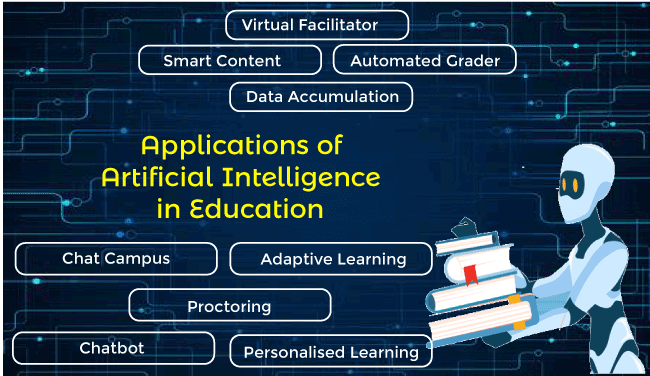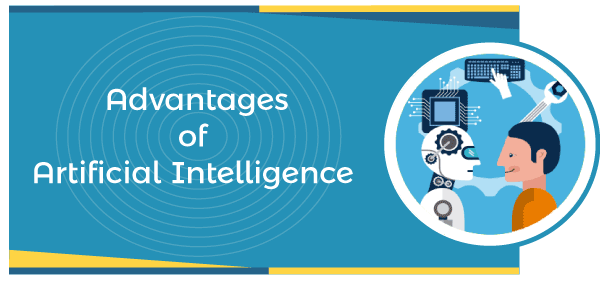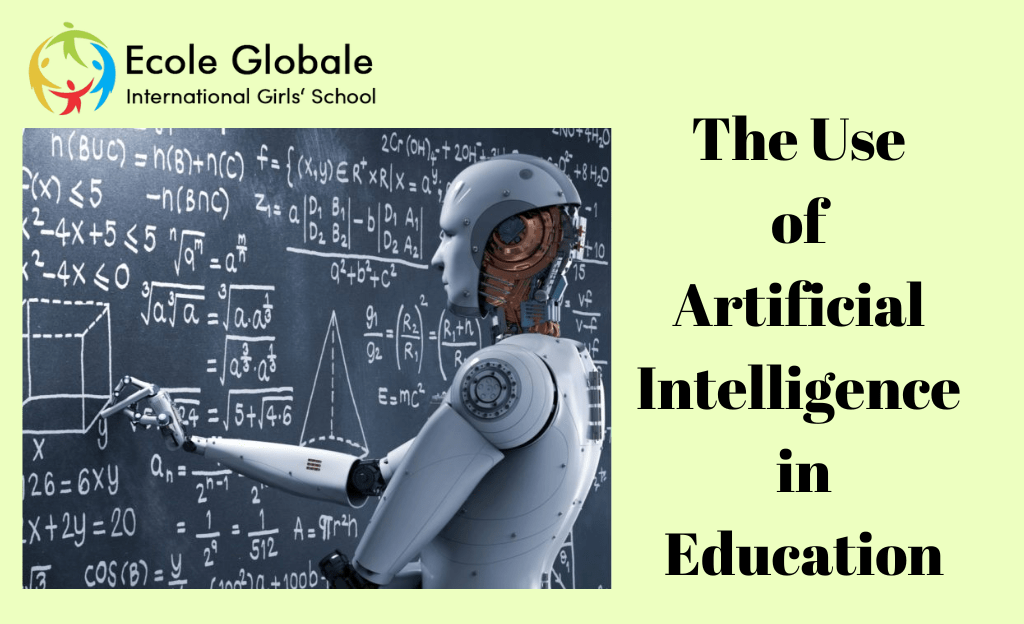The definition of Artificial Intelligence (AI) is the intelligence exhibited by machines or software and the branch of computer science that develops machine learning and artificial neural networks. Artificial intelligence refers to machines that imitate human thought processes through algorithms.
Artificial intelligence (AI) is the intelligence exhibited by machines or software and is involved in the design and development of computer systems. The field of AI includes both practical methods of creating intelligent machines and fundamental research into the nature of intelligent behavior.
Importance of the field of Artificial Intelligence in Education

There is a lot of talk about the importance of artificial intelligence in education. The technology is being used by educators to develop and design new learning tools, materials, and assessments.
As per research conducted by the Best boarding Schools in India, Artificial intelligence has been used in many fields for decades now. But its application in education has only recently gained traction. Artificial intelligence in Education can be applied in many ways- it creates personalized lesson plans based on previous performance, helps students struggling with concepts or topics, and assess their skills and abilities.
Applications of Artificial Intelligence in Education

Personalized learning
Artificial intelligence in education to can help create personalized learning paths for students based on their interests and strengths/weaknesses within different subject areas (e.g., maths, science, history). These algorithms can also track students’ progress along these paths so that they know what they need help with at any given point in time during their educational career.
According to the Top Boarding Schools in India, Artificial intelligence in education can be applied to personalize the learning experience to meet the individual needs and preferences of each student. It is important as different students learn differently from one another and therefore require different teaching methods and assessments. With artificial intelligence in education, teachers can tailor their lessons specifically for each student’s needs, so that every student receives an individualized education plan that best suits their academic ability level, interests, and learning style.
Tutoring and assessment
One of the most promising applications of artificial intelligence in education is tutoring systems. These systems use a combination of natural language processing and machine learning algorithms to provide customized feedback on student essays or projects. Tutoring systems can provide feedback on grammar, usage, mechanics, and style through automated grading processes based on statistical models trained using past student work as input data.
There are three main ways that AI can be used for assessment purposes: formative assessment, summative assessment, and diagnostic assessment. Formative assessments are used throughout the year as part of coursework; they’re often done as part of homework assignments but don’t count toward final grades.
Intelligent content delivery
Artificial intelligence in education intelligent content delivery is the process of delivering appropriate educational content to learners at the right time through different channels, taking into account their learning preferences and needs. For example, a learner may want to watch an educational video on a topic they are interested in but do not have enough time right now due to other obligations such as work or family commitments.
An intelligent system would be able to identify users’ interests based on their previous experiences with the system and deliver videos accordingly so that learners can access learning materials at the right time and place without having to search for them manually.
Intelligent content delivery systems help students learn better by providing them with customized study materials that match their needs, grade level, and learning preferences.
The intelligent content delivery system uses a machine learning algorithm that analytically understands the student’s performance data such as grades, test scores, and homework completion status. It helps the system customize study materials for each student based on their academic background and needs.
Adaptive testing
Artificial intelligence in education algorithms can analyze student data, such as past test scores and class performance, and design personalized lessons that best fit each student’s needs. These algorithms will also notify teachers if a student is struggling with a certain concept or subject area so that they can intervene accordingly before it becomes an issue later down the road.
Adaptive testing refers to a computerized assessment that automatically adjusts its difficulty based on an individual student’s performance. Adaptive testing can improve students’ performance on standardized tests by reducing stress and helping students focus their efforts on the areas where they are having difficulty.
Automated grading and feedback
Students can be given tests that are automatically graded by artificial intelligence in education programs. It allows teachers to focus on other aspects of their job, like teaching and interacting with students.
Automated grading can help teachers to focus on teaching instead of grading. It also leads to more insights into student performance because it gathers data from their assignments like tests or quizzes. These insights can be used to personalize learning paths for each student which increases student engagement and helps them learn better by tailoring the material to their needs.
Advantages of Using Artificial Intelligence in Education

Improved student engagement
Artificial intelligence in education can improve student engagement by providing a personalized learning experience for each student. The technology can analyze data from previous class assignments and use this information to create educational content relevant to each student’s individual needs. Many students are required to complete specific tasks before they can move on to the next assignment or test, so this type of personalized learning can help them get ahead in their studies without sacrificing time with friends or family members.
Increased efficiency in the classroom
One of the biggest benefits of using artificial intelligence in education is increased efficiency in the classroom. Thanks to AI, teachers can spend less time on mundane tasks and more time interacting with students and helping them learn new concepts. It allows students to get more personalized attention from their teachers and ensures that no student feels left behind or forgotten.
Enhanced student learning outcomes
Another advantage of using artificial intelligence in education is better learning outcomes for students. The use of AI means that teachers can tailor their lesson plans to meet each student’s individual needs and ensure they’re working at their best levels throughout the school year. It helps ensure that all students can learn effectively and reach their full potential without having any gaps in their learning experience.
Ability to provide real-time feedback
Artificial intelligence in education is now being used to improve the learning experience for students. It can help educators monitor students’ progress and provide feedback in real time. It can be especially useful for students who have special needs or those who struggle with certain aspects of the learning process. For example, if a student has trouble with maths, they may be able to receive immediate assistance from an AI teacher that is tailored specifically to their needs.
Communication between teachers and students is essential if they’re going to get along well together in class. However, with so many students taking part in each lesson, it can be difficult for teachers to keep track of everything that’s going on in their class at any given time. AI offers a solution here by providing real-time data about how each student is performing during each lesson so that teachers.
Cost-effectiveness
Artificial intelligence is not expensive compared to human labor. For instance, if you want to hire a teacher for your child, you will have to pay them a lot of money every month. On the other hand, robots do not need any payment or incentives because they do not get tired or sick. Therefore, you must consider using artificial intelligence to save on your budget since you will not have to pay for salaries or other benefits.
Challenges and Limitations of Artificial Intelligence in Education
Data privacy and security
One of the biggest challenges facing AI in education is the issue of data privacy and security. With more devices collecting information about students’ interactions with technology, there is an increasing risk of cyberattacks on school networks or personal devices. Schools will need to develop strategies that ensure student data is safe from hackers while allowing teachers access to the information they need to improve teaching methods and learning outcomes.
Lack of human interaction and personalized feedback
AI relies on data sets to learn from past experiences. These data sets must be created by humans who interact with each other in real-time through their devices using social media platforms. Data sets generated from these platforms are not accurate representations of real-life scenarios because they lack human interaction and personalized feedback that would provide better insights into how people interact with each other online.
Conclusion
Artificial intelligence is the future of education. Artificial intelligence in education has been around since the early days of computers. Today, it is a more mature technology and its application in education is becoming more mainstream.
There is a demand for the incorporation of AI in the classroom and artificial intelligence has the potential to revolutionize education. Educational AI is a revolutionary technology. It can open many new doors for teachers and students, answer age-old questions, and help us better understand the world around us. There are many unanswered questions and much we have yet to learn—but the future looks bright. We can’t wait to see where educational artificial intelligence will lead us.
For any queries related to parenting, schooling, or any students-related tips, click here to check out our latest blogs.









